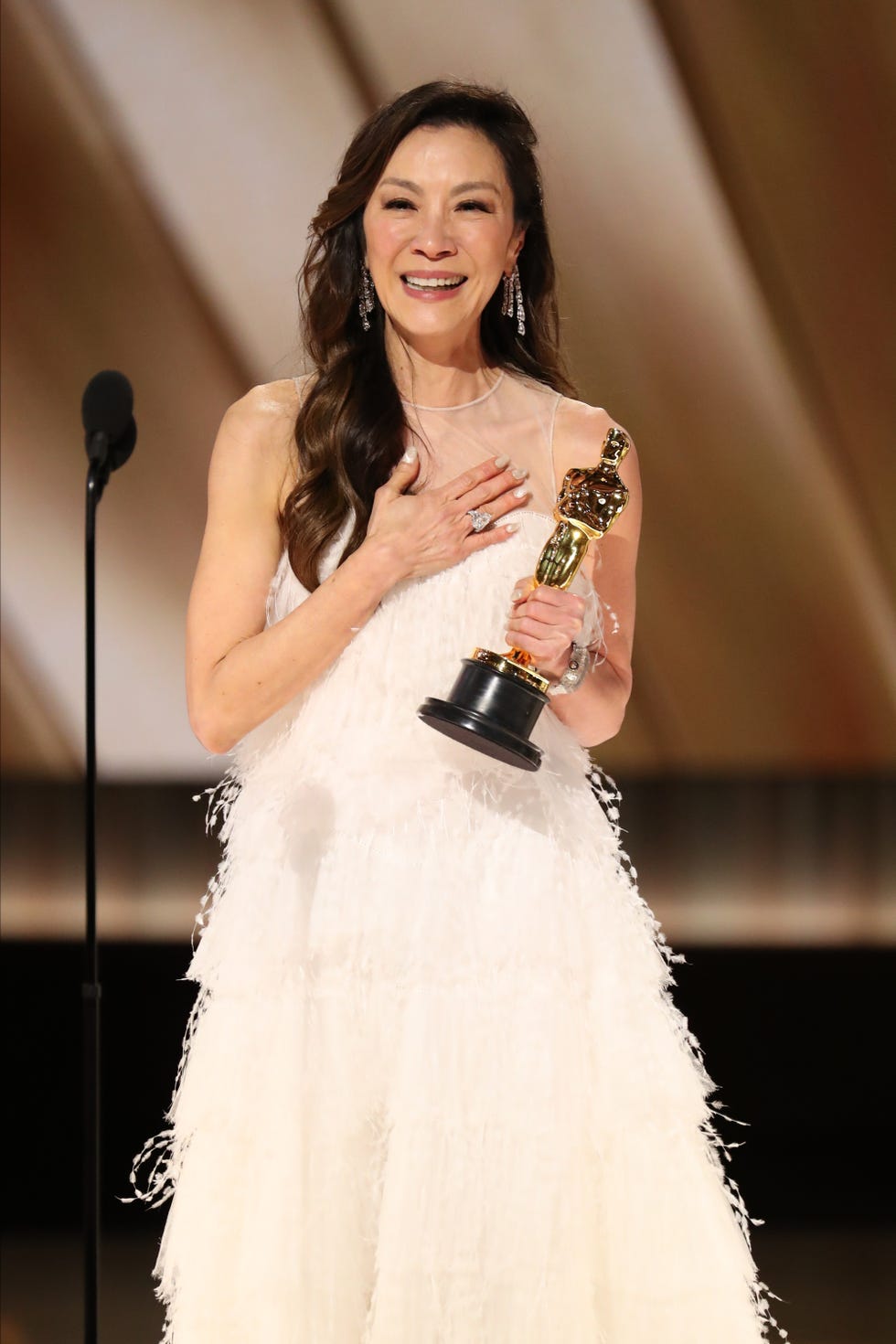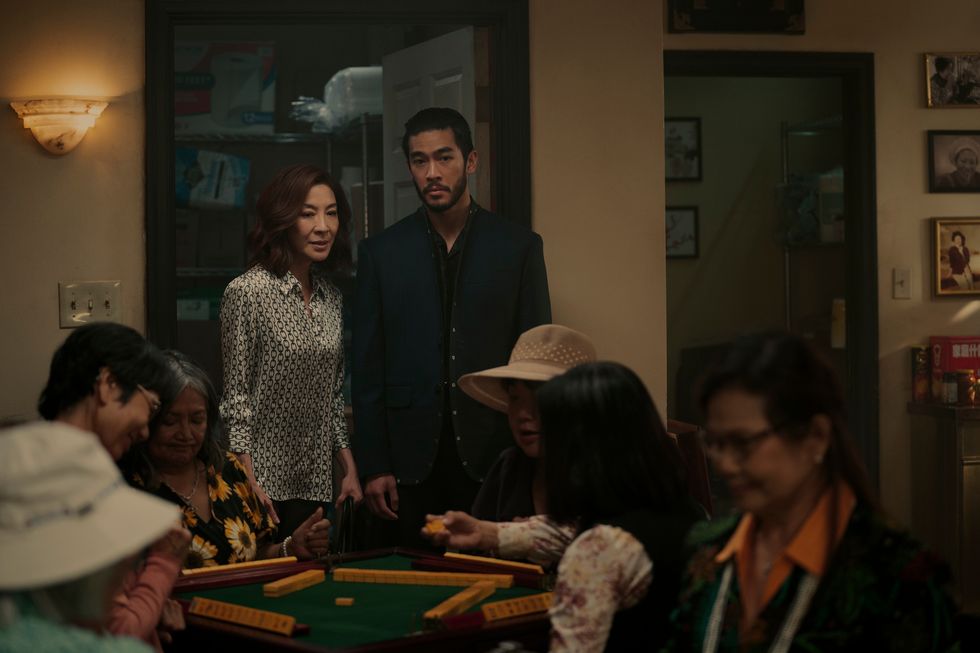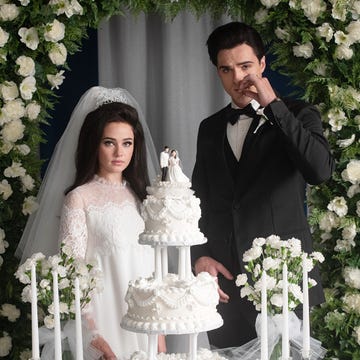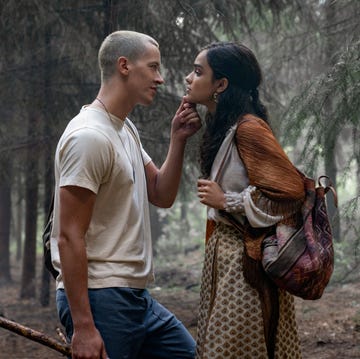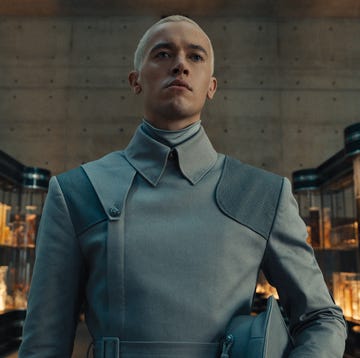Michelle Yeoh was already an established action star in Hong Kong when she was introduced to Western audiences in 1997 as Wai Lin, a Chinese secret agent and reimagined Bond girl, playing against Pierce Brosnan’s 007 in Tomorrow Never Dies. Since then, she has played—among many other roles—a sword-slinging, roof-jumping, superhumanly balletic warrior (Crouching Tiger, Hidden Dragon), the kind and clever mentor to a younger woman (Memoirs of a Geisha), a botanist among a group of astronauts tasked with reigniting the dying sun (Sunshine), a real-life Burmese politician who has since fallen from grace (The Lady), and a Starfleet captain and ruthless emperor (Star Trek: Discovery).
But in recent years, Yeoh has become best known for playing dutiful traditional Asian mothers who want to reconnect with their adult children: Eleanor Young in 2018’s Crazy Rich Asians, Evelyn Wang in 2022’s Everything Everywhere All at Once (the performance that made Yeoh the first Asian to win the Academy Award for Best Actress), and now Eileen “Mama” Sun in Netflix’s just-released series The Brothers Sun.
“Every time I take on a role, it has to be different,” Yeoh, 61, tells Harper’s Bazaar on a recent video call from Los Angeles. “I don’t want to be playing the same characters over and over again. You’ll be bored, I’ll be even more bored, and it’s not challenging in that sense. But with Eileen, I have not played a character like this [before], where a mother has sacrificed so much. She has to go down so low to be able to come back up again, so that she could save at least one of her children.”
Created by frequent Ryan Murphy collaborator Brad Falchuk and newcomer Byron Wu, the eight-episode action-dramedy follows Charles Sun (Justin Chien), the son of a powerful Taiwanese gang leader, as he travels to Los Angeles to protect his shrewd mother (Yeoh) and clueless younger brother Bruce (Sam Song Li), after a mysterious assassin puts Charles and Bruce’s father in a coma. As Taiwan’s deadliest criminal organizations fight for dominance, Eileen and her sons must repair the damage their separation has caused before their enemies strike again and unseat the vulnerable Sun family. “It’s cool, but it’s done with such dark humor,” Yeoh says.
In our conversation below, the legendary Malaysian actor reflects on her historic Oscar win, the state of Asian representation in Hollywood, her musical debut in Crazy Rich Asians director Jon M. Chu’s upcoming two-part film adaptation of Wicked, and her imminent return as Philippa Georgiou in the Star Trek universe.
What kinds of conversations did you have with Byron and Brad about playing a new kind of matriarch in The Brothers Sun?
For me, the most important thing was: Who is Eileen? How did she get to be where she is, married to the Triad boss? By the time you go to Taipei and visit her mother [in episode six]—the mother stays in a huge mansion with servants, so Eileen did not come from a poor family, where she was also living off the streets, being a gangster. When I work on a character, I have to be able to put aside [Crazy Rich Asians’] Eleanor and [Everything Everywhere’s] Evelyn, because Eileen has her own voice, and she’s her own person. I started creating her backstory—the way she walks and talks, the way she handles herself, how she is with her children. If you compare, you will see three [different] women—and that, for me, is the true challenge.
When you first meet Eileen, she looks like the [stereotypical Asian immigrant] mom, right? The auntie who goes to play mah-jongg; she works hard for a living. She’s got a happy disposition, she’s got a son that she loves very much—which is very different from the other Es. Evelyn is frazzled. She’s like, “I don’t want to be here. Everything is so depressing and angry.” So it’s important to understand the story we’re trying to tell. Byron had created this fantastical, crazy world of gangsters coming from Taiwan, and suddenly the whole gangster world descends upon Los Angeles. It’s cool, but it’s done with such dark humor. At the end of episode one, when Eileen goes, “Bruce, go to bed.” [Imitates the sound of a bone drill.] “Charles, help me get rid of the body.” That was funny. [Laughs.]
You have said that The Brothers Sun explores what it means to make difficult choices to protect those you love most. Can you pinpoint a moment in your own life when you had to make a difficult decision to protect someone you loved?
Yes. Stepping away from my previous marriage was probably the decision that is like, “Okay, I have to do this now, because it’s not going to get better.” [Yeoh and her first husband, Hong Kong business magnate Dickson Poon, divorced in 1992 after she discovered she was unable to have children. They remain good friends, and Yeoh is godmother to one of Poon’s daughters.]
Sometimes, those kinds of decisions are the hardest. But when you do it out of love and the feeling that this will only make things better, you just have to do it; you have to keep moving on. Sometimes, you make bad choices, but you have to turn around and say, “Okay, just make sure you don’t do it again.” We don’t always succeed in whatever we want to do. And when we don’t, we try to learn from that failure or that fall, so that we can next time be able to jump even higher without falling.
Last March, you became the first Asian to win the top acting prize in the almost-century-long history of the Academy Awards. What was going through your mind as you held your partner, Jean Todt, and costar Jamie Lee Curtis’s hands while your name was being called? What do you remember about embracing Halle Berry—the only other woman of color to win this award—and delivering a speech for the ages?
Best Actress is [announced] second to last, so you sit there the entire night and you’re like: I have to just keep breathing. And then, suddenly, it struck me: “Oh my God, it’s early in the morning in Malaysia, and my mom is sitting there with three hundred, four hundred people that have come together in support of me. What if I lose? How am I ever going to go home again?” [Laughs.]
Jamie reaches across and is like, “It’s okay.” And then Ke [Huy Quan, who played Evelyn’s husband, Waymond] was like that. And I’m like, “You two have your Oscars right beside you, and you’re giving me that ‘Don’t worry! We will love you even if you don’t get it, okay’?! I want to die!” I’m holding Jean’s hand, and he’s even more nervous than I am. He kept saying to me, “Who knows the results?” I’m like, “Nobody! It’s the accountants!”
When they called my name, I swear, at that moment, [I felt] that overwhelming sense of “Thank you, God.” We were all up and jumping, and I was like, “Just breathe! Breathe.” In the end, it was Jamie who said, “Go up! You have to go up and get your Oscar!” Halle was crying so hard; she was so overjoyed for me. I think it meant a lot for her as well, because when she received the Oscar, she was the first African-American actress [to win]. So I guess she understood that overwhelming sense of responsibility, because everybody is looking at you. I remember the weeks prior, Asians all around the world, especially here, would come up and say, “Yes, you can do this. You’re going to do this for us.” And I’d go [in a timid voice], “Okay … I’ll do this for us.” [Laughs.]
The Academy Award is seen as the pinnacle of success for an actor. Compared to a few years ago, have you noticed a shift in the kinds of roles you are offered now, or the kind of negotiating power you have in meetings with executives to address issues like diversity and equal pay?
There’s definitely been an important shift, I must say. A lot of us have been pushing the envelope and trying to kick that glass ceiling to hell for a while now. It didn’t happen overnight. The other day with [Netflix co-CEO] Ted Sarandos, when we were at the premiere of The Brothers Sun, he said, “I came in maybe 15 years ago to Netflix with some other [Asian] project, but at that time, the Asian stories were not quite as interesting. They were like, ‘Well, we don’t know whether there’s an audience for it.’” We [as Asians] have to keep changing their minds to say, “This is what your audience wants.”
Thank God, with Crazy Rich Asians, Everything Everywhere All at Once, Shang-Chi, with more Asian stories being told like Beef and Parasite, the awareness of all these [projects] makes a difference—and the audience wants it. We are very much part of the community and society, so why are our stories not told in the same way as everybody else? So I think it’s very important to work with each other and not say, “Oh, well, I’m only going to do these kinds of films.”
With Brad [Falchuk, who is white], why did he champion an all-Asian story? Because he had the vision. For him, a good story is a good story—it doesn’t come from the color of your skin or the language you speak—to be a good storyteller. I think it does make a huge difference, because when you try to talk about equal pay with that, this is nothing new. “Oh, if you’re a woman, you’re paid less. If you’re a man, you’re paid more.” But … why? Do we work less hours and bring in less for you? So there are fights that are worth fighting for, and yes, we will keep fighting for it, and it takes those who have the ability to fight for the rest of us.
Given that you have gone through the gauntlet of Oscar campaigning, is awards recognition still important to you?
I always believe that you should not have that burden where you start the project thinking, I’m doing this for an award. I’m doing this because this is a story that’s going to be so amazing to tell and needs to be told, whether it’s a comedy, whether it’s action, whether it’s an indie film or a blockbuster Marvel story. Every story has its own charm, so it’s up to you, when you choose to do it, to make it worth your time.
When we made Everything Everywhere All at Once, do you think anybody ever thought that [winning seven Oscars was possible]? It was, like, six genres in one movie. But fortunately for us, the stars aligned. The way people thought also changed with time. The way the Academy thought also changed, because technically, in the old days, you would say, “Oh, [the winner] has to be a very dramatic, heavy film.” You have to tick all the boxes, and we ticked all the wrong ones. [Laughs.] And then we ticked all the right ones!
In recent years, there has been a noticeable trend of older—but still largely white—women who are now executive producing and starring in their own projects. Considering that you’ve accumulated over 40 years of experience in the industry, have you ever considered working more on the business side or behind the camera? Or are you more content with championing writers and filmmakers in your capacity as an actor?
I would do both. Life is much easier when you’re just an actress, but when I look at Reese [Witherspoon and her company, Hello Sunshine], I’m like, “Yes, woman! That’s the way to do it. Don’t just sit around waiting for someone to offer you something that you want to do.” But it takes a lot of effort. You can’t do it by yourself, basically. As an actress, you are generally just working for yourself. I can work by myself with the script; I only need to work closely with my director and my producer or the writer. But if you do [work] behind the scenes—I’ve produced before, and that’s my next big step, as well—you need to draw in the right people that you want to work with. And only then can you start finding more [projects to produce] because otherwise, how are you going to read all those books out there? [Laughs.]
You’re in the final stages of filming Wicked in London and about to start shooting Section 31 in Toronto. What have you enjoyed most about working with Ariana Grande, Cynthia Erivo, and Jonathan Bailey on Wicked? And how are you feeling about leading this new chapter in the Star Trek franchise?
I still have a few more days left on Wicked. Unfortunately, we were almost done, and then the [actors’] strike happened. I felt bad because I love Jon Chu. I think he’s one of the best directors around. Spending time with Ariana and Cynthia, you feel like you’ve gone where angels sing, because they have the most amazing voices and they are simply a dream to work with.
Cynthia is so good at her craft; she’s so professional. When you’re working with someone like that, you draw on each other. This is Ariana’s first major movie, and she holds herself so well because she’s so dedicated—and that’s what I love. When people are devoted, all they want to do is to be the best. Every day going on set, we are so beautifully dressed. You sort of strut around. [Laughs.] It’s so much fun, that’s all I can say. I’m going back to London in a couple of days. It’ll be sad to wrap it up, but that’s how it is. And Jonathan is a dreamboat!
We’ve been wanting to do Section 31 for a while now, so big thanks to [executive producer] Alex Kurtzman and [writer] Craig Sweeny, who has taken four years to write the most amazing script for us. I can’t believe we’re actually starting the journey now.
This interview has been edited and condensed for length and clarity.
The Brothers Sun is now streaming on Netflix.

Max Gao is a freelance entertainment and sports journalist based in Toronto. He has written for The New York Times, Los Angeles Times, NBC News, Sports Illustrated, The Daily Beast, Harper’s Bazaar, ELLE, Men's Health, Teen Vogue and W Magazine. Follow him on Twitter: @MaxJGao.


